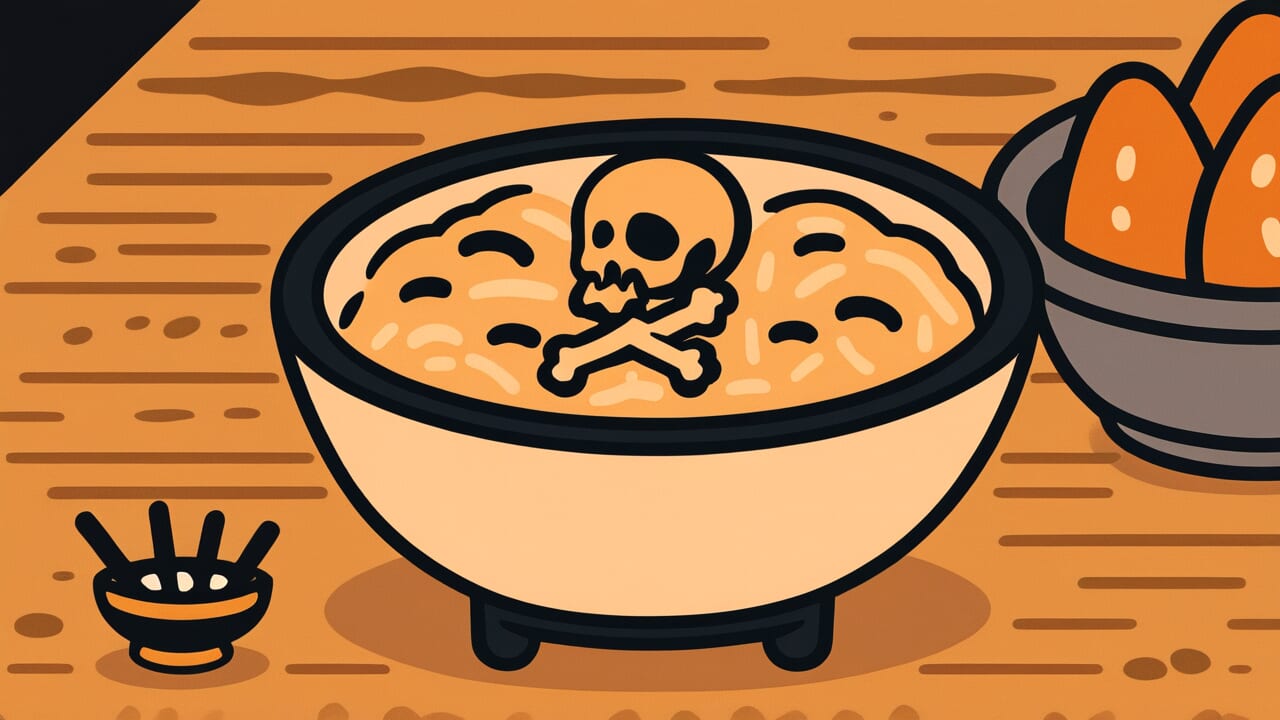How to Read “A bone in cooked rice”
Kome no meshi ni hone
Meaning of “A bone in cooked rice”
“A bone in cooked rice” is a metaphor for finding an unexpected flaw or problem in something you thought was perfectly safe.
This proverb describes situations where something you normally use without worry suddenly reveals a hidden pitfall or defect.
The things we trust most in daily life, like cooked rice, are exactly where we let our guard down. That’s when unexpected troubles can hide.
People use this saying when a supposedly perfect plan reveals an unforeseen problem. It applies when a trusted person or system shows a surprising flaw.
It also fits when something you expected to go smoothly hits an obstacle.
Even today, everyone has experienced finding overlooked problems in things they thought were completely safe. This happens in daily life and at work.
This proverb still offers a valuable lesson. It warns us against becoming too comfortable and careless.
Origin and Etymology
No clear historical records explain the origin of this proverb. However, the structure of the phrase offers interesting insights.
“Cooked rice” refers to the most basic and ordinary food for Japanese people. Before the Edo period, white rice was a special treat for common people.
As time passed, it became the everyday staple food. The foundation of this proverb rests on the assumption that cooked rice should never contain bones.
Getting a fish bone stuck in your throat has always been a familiar mishap in Japan. However, finding a bone in cooked rice should normally be impossible.
That’s exactly why this proverb creates such a powerful impression. It captures the shock and lesson of “finding unexpected danger in something you thought was absolutely safe.”
One theory suggests the saying comes from regional cooking customs. In some areas, people cooked fish together with rice.
This occasionally led to accidents where bones got mixed in. The proverb likely embodies practical wisdom about how small moments of carelessness in daily life can cause unexpected trouble.
Usage Examples
- We thought the new system was perfect, but it was a bone in cooked rice—a critical bug appeared right after launch
- I thought he was trustworthy, but this is truly a bone in cooked rice—he betrayed me at a crucial moment
Universal Wisdom
“A bone in cooked rice” teaches us about the danger of familiarity and complacency. The more we encounter something daily, the less we question its safety.
The assumption that cooked rice we eat every day couldn’t possibly contain bones is the heart of this proverb.
The human brain seeks efficiency by storing repeated experiences as patterns. Once something becomes a pattern, it drops off our list of things to watch carefully.
This works well as a survival strategy, but it’s also a major pitfall. The comfort of “business as usual” can cause us to miss real dangers.
Looking deeper, this proverb also suggests the truth that nothing is perfect. No matter how reliable or ordinary something seems, it always has some flaw or limitation.
Our ancestors understood this reality of life.
That’s why this proverb isn’t just a warning. It teaches the importance of humility.
We should abandon the belief that anything is “absolutely safe.” Maintaining a questioning attitude protects us from unexpected troubles. This is true wisdom.
When AI Hears This
Human brains evolved to be extremely sensitive to negative information. Missing danger could mean death.
Nobel laureate Kahneman’s prospect theory shows that people feel losses about 2.5 times more strongly than equivalent gains. Losing 100 yen hurts 2.5 times more than gaining 100 yen feels good.
Analyzing “A bone in cooked rice” with this number reveals surprising facts. Imagine a bowl contains 300 grains of rice.
Even if 299 grains are perfect, that single bone as a “loss element” gets processed in the brain as 2.5 grains worth of negative information.
Furthermore, bones represent physical danger directly linked to survival. The actual attention allocation becomes even more extreme.
Brain scan research confirms that the amygdala, which processes danger signals, reacts several times faster to threats than to positive information.
This proverb shows that human attention doesn’t work on an objective ratio of “299 good to 1 bad.” Instead, it operates on a subjective weighting of “1 good to 2.5 or more bad.”
We focus on tiny foreign objects rather than perfect meals. This isn’t a character flaw.
It’s an inevitable side effect of a cognitive system optimized to increase survival probability.
Lessons for Today
This proverb teaches modern people the importance of “courage to question the ordinary.”
We’re surrounded by systems we’ve used for years, relationships we trust completely, and daily habits we never doubt.
That’s exactly why we need to pause regularly. We should check whether problems exist or if we’ve overlooked any flaws.
This doesn’t mean becoming paranoid. Rather, maintaining healthy skepticism helps us build more solid trust and safer environments. It’s a positive attitude.
Like regular car inspections, we should develop the habit of occasionally checking the things we take for granted.
This proverb also teaches “freedom from perfectionism.” No matter how much you prepare or how careful you are, unexpected flaws will appear.
Accept this reality and maintain the mental flexibility to respond. That’s the wisdom for surviving in modern society.
Give the things you feel most secure about a gentle second look. This kind of warm attentiveness will surely enrich your life.



Comments